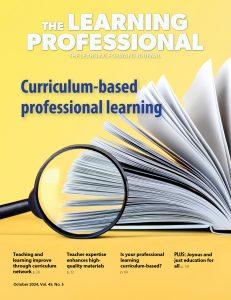DALLAS—July 10, 2010—The National Staff Development Council received a $250,000 grant from MetLife Foundation to initiate the revision of NSDC’s Standards for Staff Development. First published in 1995 and revised in 2001, the standards represent the collaborative work of NSDC and 17 other professional associations. Based on research, the standards define effective professional development and guide schools and districts in implementing professional learning to improve student achievement. MetLife Foundation’s support reinforces its commitment to increasing teacher effectiveness and strengthening the role of collaborative leadership in schools.
“It has been almost ten years since the standards were revised. Standards revision is essential to respond to new research in the field and requests from successful practitioners,” said Stephanie Hirsh, NSDC’s executive director. “Through the revision process, NSDC will align the standards to the new definition of professional learning. Because NSDC leads the national conversation in relation to professional development, this effort has tremendous potential for impact on educators and students. Through the standards revision, NSDC once again will assist practitioners and policy makers by developing tools and strategies that translate policy into practice.”
NSDC will revise the standards over the course of two years. During the first year, NSDC and partners will focus on the development of the revised standards. In the second year, NSDC will revise the supporting materials educators need to implement the standards into practice.
“NSDC made a significant, ground-breaking contribution to the field of education with the development of its Standards for Staff Development in 1996 and their revision in 2001,” said Dennis White, President and CEO of MetLife Foundation. “Many factors combine to compel a careful revision of the standards at this time: growing economic challenges, new research on teacher and leader effectiveness, persistent gaps in student achievement particularly in disadvantaged schools, and an urgency to better prepare all students for a demanding future. We recognize the significance of the work and are pleased to encourage and support this important initiative.”






